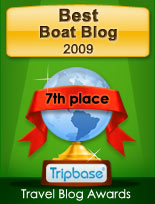Worlds Apart
Lake Victoria is a nice 10-minute walk from the front door of my friends’ house. On this casual stroll I met a woman. She was preparing a meal outside, so I struck a conversation. “Why don’t you talk like your friends?” She asked, referring to my American friends who had the Kenyan dialect dialed in. I summoned my best impression and made instant friends.
She was a widow, as was her sister who lived in the house 10 feet from hers. Both had several children. She introduced me. Several of the children were dressed in school uniforms, which, guessing by the worn look, had been passed down from the previous. The others were either too old or young or unlucky enough to afford an education. She grabbed a chair from inside her small two-room house, and placed it in the shade, where she invited me to sit as she blew and fanned the coals that cooked her vegetable root.
It was remarkable how freely the children spoke of their condition. They shared their names, their age and relation. They told me what they wanted to do in life (mostly become doctors and a couple-teachers). They told me of their father who died a few years ago and pointed to a small mound, not far from the walls of their house. “My dad died around that time too,” I shared, hoping to connect in their loss. But strangely there was little sense of loss. There were simply facts, reality.
It’s a reality we are shielded from in the United States. Of course there is tragedy in both places, but in the U.S., death sits on the curb like a homeless man. We see it out of the corner of our eye. We turn our heads, and avoid contact as we side step over the obvious, pretending it doesn’t exist. Then once it’s far enough behind us, we raise our heads and resume conversation, as though nothing happened.
But in Africa, when HIV infects up to 40% of your population, and when malaria is more common than the common cold, death is a part of life-it is reality. We talked shortly of the children’s father, and moved on. The mother would fan the flame, then stir the pot, then tend to the toddler who wandered naked as the day. Then return to conversation, smiling, interjecting. Each kid had questions, fascinated with me and my camera. Each gathering close after every shot, giddy to see their digital reflections.
“I want to talk to you about America,” said one boy. You could see his mind search for questions. “Tell me about it… is it true you have machines that wash your clothes?” “We even have machines that wash our dishes, even dry our clothes.” “Machines to dry your clothes?!” Said the mother unsure. “Machines do everything for you,” the boy replied distantly, imagining what must have been a futuristic scene. We laughed and joked as our questions painted pictures of two totally different worlds.
One girl commented on white girls not being able to carry things on their heads, a skill used daily here. Another boy analyzed my arms, then deducted that white people must need more hair on their bodies because it is so much colder where we come from. I asked about African dancing, suggesting we have a dance party sometime. I commented on the fact that no one walked around at night, explaining how much I love roaming streets by the light of the city. “There are entire cities with lights?” asked a boy, baffled by a place where more than just a few houses had power.
There wasn’t much food but the mother insisted I not only eat, but also take some back to my friends. I ate bananas that tasted like potatoes, and potatoes sweeter than bananas. Then with the light beginning to change I shook hands and thanked them for their hospitality. “I hope I will see you again,” said the boy most interested in my American life.
“I’m sure we will.” I smiled and started back up the rocky path to my friends’ house.
September 19, 2008 No Comments
A Different Life
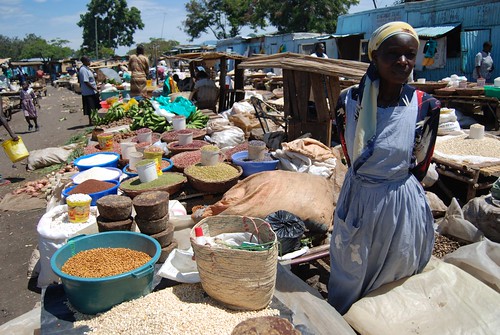 From Kisumu, Mbita it doesn’t look very far on a map, and really it wouldn’t be if traveling by private car on paved road. Unfortunately neither were available. My trip began early in the morning, making my way through Kisumu’s largest market. The smell of dried fish swam through the muggy air. Each booth beckoned offering a different product, from spices to colorful fabrics to cheap plastic flip flops which adorn the soles of many.
From Kisumu, Mbita it doesn’t look very far on a map, and really it wouldn’t be if traveling by private car on paved road. Unfortunately neither were available. My trip began early in the morning, making my way through Kisumu’s largest market. The smell of dried fish swam through the muggy air. Each booth beckoned offering a different product, from spices to colorful fabrics to cheap plastic flip flops which adorn the soles of many.
At the opposite end sits a large lot, where dust rises like smoke from the shuffling feet of bodies bound for different destinations. I find the bus, toss the bags on top, and fill the first available seat. Within minutes every space was occupied both sitting and standing. Cramped, smelly, hot, the bus starts down a road that would get progressively worse over the next several hours. The ride was not too eventful. An occasional stop, wherein a few people would shuffle off, a few on, a kind old lady or young man would approach the window offering a cob of corn while I reminisced the days of air conditioning and deodorant.
 Hours later the bus pulls to its final stop. Following the queue of passengers, I exit, collect and dust off my bag, then wander to the edge of Lake Victoria for the final leg of my trip. The water taxi is little more than a long slender canoe with a motor. You can get to Mbita by bus but to do so would add several additional hours, so I joined about 30 others in the rickety boat sitting inches from the wet murky cloud looking for hippos.
Hours later the bus pulls to its final stop. Following the queue of passengers, I exit, collect and dust off my bag, then wander to the edge of Lake Victoria for the final leg of my trip. The water taxi is little more than a long slender canoe with a motor. You can get to Mbita by bus but to do so would add several additional hours, so I joined about 30 others in the rickety boat sitting inches from the wet murky cloud looking for hippos.
Mbita is a fishing community dependant like so many others on Africa’s largest lake. Resting on the equator it is the second widest lake in the world and the source of the world’s longest river-the mighty Nile, which stretches 4,132 miles before losing itself into the Mediterranean Sea. Millions of Africans from the three bordering countries depend on it to exist and as such it has been over fished and polluted.
Mbita is just one of those villages. I walked with my old friends who had relocated from comfortable Flagstaff, Arizona years ago, through the small dirty streets of the village. “This is where you can check your email…This is where we usually buy our vegetables…We can buy bread from our neighbors.” They pointed out shack after shack on the way to their house.
Their house was made of brick with a tin roof, making it one of the nicest in the neighborhood. They were some of the few fortunate to have a shower that trickled water, and a single outlet offering power inconsistently throughout the day. There was no refrigerator, no oven, no toilet. To cook they use a propane tank fueling a single burner. 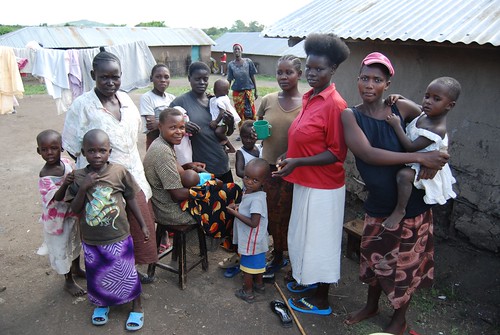 When nature calls there is set of covered holes, shared by several houses, sitting 40 yards away. It is a different life, where in America the living situation would be considered impoverished, unlivable even. But here in Mbita, you look around and consider yourself blessed.
When nature calls there is set of covered holes, shared by several houses, sitting 40 yards away. It is a different life, where in America the living situation would be considered impoverished, unlivable even. But here in Mbita, you look around and consider yourself blessed.
That night with a cool breeze caressing my face, I stood outside the door looking into the dark peaceful distance. Lights sparkled across the horizon. “Do like our view of the city lights?” My friend J.P. asked. “It’s really cool,” I replied not realizing he was joking. The sparkling lights were from lanterns but not from the city. It was the lake. Hundreds and hundreds of fishermen scattered across the darkness like fallen stars. Floating lanterns beckoned bugs that lured the fish that would feed their families. This was life. And it was different life than any I’d seen before.
September 10, 2008 No Comments
Picking Up The Pieces
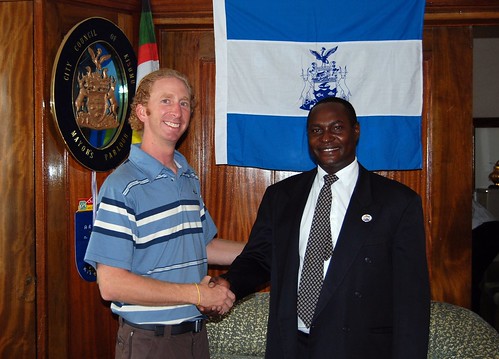 Is violence ever justified? Is it ever proper to fight? How long can you talk things through when everything said falls on deaf ears? At what point do you lay down sickle for sword? And once arms have been taken, how far do you go? Do you give your life? Do you take a life? Can you ever turn back?
Is violence ever justified? Is it ever proper to fight? How long can you talk things through when everything said falls on deaf ears? At what point do you lay down sickle for sword? And once arms have been taken, how far do you go? Do you give your life? Do you take a life? Can you ever turn back?
Returning to Kenya raised a lot of questions. At the turn of the year, distressing visions poured into our living rooms. Livid mobs marching, machetes raised in protest. The sparked anger turned to flames and houses, churches, cities turned to ash. Military filled pickup trucks with the fallen opposition. Dead or alive these people would be heard.
When your country is one of the most developed in Africa. When it is looked to as an example of democracy in a continent plagued with political corruption. Then when in election the front-runner by nearly a million votes mysteriously loses to the reigning president, there are bound to be problems. The populous had been asked to choose, then the chosen dismissed. When the process was compromised, and a compromised people saw their hopes dashed with justice, they took matters into their own hands.
Within days over 300 people lay dead, burned and beaten. Nairobi, Kenya’s capital, was in disarray. Another violent center was the western port city-Kisumu, home to the Luo tribe (one of the largest tribes in Kenya and that of the challenging candidate). When I arrived Kisumu the air was no longer tense, but the signs were everywhere. Charcoal skeletons of cars and buildings sat as shadows on the sides of streets. Things were getting better and behind it all was a newly elected mayor.
I met Mr. Sam Okello on the plane from Zurich to Nairobi. After a brief conversation about Barack Obama, whose father as you may know was also from the Luo tribe, Mr. Okello extended his hand, card and an invitation to visit when I passed through Kisumu. So I called the morning after I arrived and within a day I was sitting in a large office in the Kisumu city hall.
He walked into the room with a glowing smile. The line of people waiting to see him told me he was busy but his confident demeanor was relaxed. Before the meeting I had written a list of questions. I was anxious to learn: What happened? Was it justified? How do you move forward? Is there hope? But when we finally sat down to talk, we sat as friends. I told him who I was, my hopes, my plans. He told me a bit of the same. Then he invited me to join him later that night, when he and the trustees would discuss the direction for this troubled town. I was honored to accept.
“This is my friend, Derek.” Okello introduced, explaining to this group of leaders the value of an outside opinion. They were all welcoming and after a short opening prayer we sat. As I watched these minds mingle, exploring the problems and solutions of their community, I was filled with a sense of hope. I had seen the effects of colonialism in Malawi, of tourism in Tanzania, and now the after effects of a people betrayed. I had also heard story after story of corruption.
Kenya was the supposed light of democracy, but in a moment that light began to flicker, dimming with the hopes of not just a country, a continent. Kisumu was a broken city, with a broken infrastructure and shattered spirit. Yet now in downtown Kisumu, in some hotel around a table of thought with those most affected, the light returned. I heard the concerns of each individual. I saw the long list of needs fundamental to exist. More importantly I saw the vision of a man and group to restore order.
I’m still not sure how or why I was at that table. One guy trying to see the world passing through town. But I’m glad I was. I sat in the back seat of Mr. Okello’s vehicle and reflected as the chauffer led me home. I know it was just a meeting, but I couldn’t help but feel I had seen the beginning or at least return of something special… Hope.
August 27, 2008 1 Comment
Fly 54O
It sounds like a tragic made for T.V. movie. I knew it, however, when given the option of safety or saving 9 times out of 10 I opt for the savings. My reasoning goes something like this:
“This one seems a LOT more reputable… ah, but this one is cheaper…”
“Yeah but, it’s only $40.” I tell myself.
To which I reply, “$40 can go a long way in Africa: 3 nights worth of hostelling. A bag full of exotic wood-carvings. 100 avocados the size of cantaloupe… 100 avocados?”
“But what good are avocados if you’re dead, Derek?”
Then I play the “chance” card. “Think about it Derek… how often does a plane crash? (A question I have no idea the answer to, but assume it can’t be high.) And what are the chances that you, one person, would be on that one plane, that one day in history… People take this flight everyday… Derek… EVERY-day!”
Well I can’t argue with that. Cheaper is better, despite the name of the airline alone, Fly 540 (yes that’s the name) has destiny written all over it. So I purchased the ticket: Nairobi to Kisumu, on “Kenya’s First Low Cost Airline”. There are two points I had forgotten about when debating safe or save. One being Mandi, my flight attendant friend who told me on numerous occasions the concerns of her captain counterparts for flying no-name African airlines (where apparently the safety regulations are not quite as high as in the States). Secondly, flying in Africa is always an adventure. Here are some examples:
Nairobi, Kenya to Blantyre, Malawi. First day in Africa, Mandi and I arrive the Nairobi airport early to wait and purchase the tickets we were unable to online. With less than an hour to spare the ticket counter opens and informs us there there is no way to take a credit card for payment (in this the capital and main international airport of Kenya). So whilst, Mandi waits and makes sure no one forgets us, Derek runs all over Nairobi looking for an ATM, withdraws the maximum amount and spends most of the money on-hand for the ticket. We got on and while making one unexpected stop, we arrived safely.
Blantyre, Malawi to Dar Es Salaam, Tanzania. What should have been an hour ended up taking around five. While the tickets read direct, in fact we made two unexpected stops in two different countries to pick up and drop off customers. We arrived-tired but safely.
Dar Es Sallam to Zanzibar. Only a 30-minute plane ride but not uneventful. Everything seemed great as the packed plane took off. Cool, comfy, satisfactory. Then with in 5 minutes I see some thing fall from the luggage compartment on the person in front. Nothing big just something. I look closer and see a cockroach poking its germy disgusting face in and out of the luggage compartment ahead. I begin to look around and see them all over. One scurrying as the lady a few seats up, lowers her food tray. Then one peaks out of the magazine rack in front of Mandi (who as you know has sort of bug problem). She freezes. I swat, pretending I got it, then try not to freak as I feel it scatter to and fro across my foot and ankles. We arrive. Safe but disgusted.
Zanzibar to Dar. Return flight a few days later. Same airline as before but no bugs this time. That’s because it was much too hot for them. I think they decided it was more comfortable flying in a plane wherein the air con was not broken and all it’s passengers sweating profusely as they clinged to consciousness. We arrive. Safe but dehydrated.
Now, finally Fly 540 with service from Nairobi to Kisumu. I’ll admit it’s humbling walking by all these nice ticket counters looking for your “budget” airline. You stop and ask. “Who?” they say, then after a moments pause vaguely reply, “Oh… I think over there…(?)” I locate the counter, get ticketed, and spend the time waiting to board wondering just when the last time I told my mother I loved her was.
Walk across the tarmac. Climb the long lonely stairs into the “low-cost” airplane. I sit in my assigned seat and proceed to buckle my seatbelt. As I tug on the male end of the seatbelt, I notice something isn’t right. Specifically, it’s unattached. I walk might seatbelt up to the flight attendant, who follows me back, looks, and says, “You might want to find another seat.” Yes… yes I might.
I do. In the back of the plane. Knees pressed firmly into the slightly dismantled magazine pocket on the seat in front. I give the seatbelt a few good tugs, but not too many so as not to undo anything intended to be done. We take off. I watch as we climb around thunderheads, dipping and dropping unexpectedly. Lightning flashes as fast as the memories of life. “Avocados…” I keep assuring myself, although eating was about the last thing I wanted to do at the moment.
Well as you know from the 1st person account, I arrived. Shaken and stirred, but safe. And an extra $40 bucks in my pocket. Now I had one thing to find: avocados… that and a phone to tell my mom I love her.
August 19, 2008 1 Comment
Self and Service
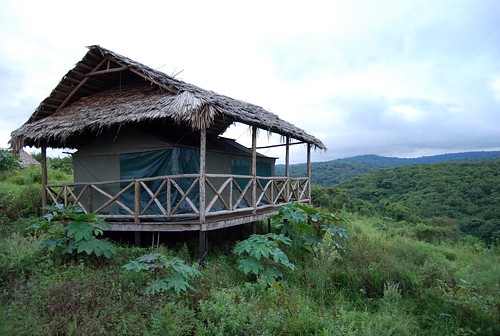 This is one place I can guarantee you’ll leave feeling better about yourself. Partially because you’ll have had one of the most comfortable nights of your life, melting into a pillowy mattress that’s been pre-warmed with a hot water bottle, after returning from a long day dodging rhinos. Partially because you’ll have eaten one of the best meals of your trip prepared and served flawlessly by local hands. Partially because when you unzip (yes… unzip) your front door in the morning and walk out onto your own personal deck, your rested eyes will think they’re still dreaming as you gaze peacefully over miles and miles of lush African land decorated with a collage of flowers and crops.
This is one place I can guarantee you’ll leave feeling better about yourself. Partially because you’ll have had one of the most comfortable nights of your life, melting into a pillowy mattress that’s been pre-warmed with a hot water bottle, after returning from a long day dodging rhinos. Partially because you’ll have eaten one of the best meals of your trip prepared and served flawlessly by local hands. Partially because when you unzip (yes… unzip) your front door in the morning and walk out onto your own personal deck, your rested eyes will think they’re still dreaming as you gaze peacefully over miles and miles of lush African land decorated with a collage of flowers and crops.
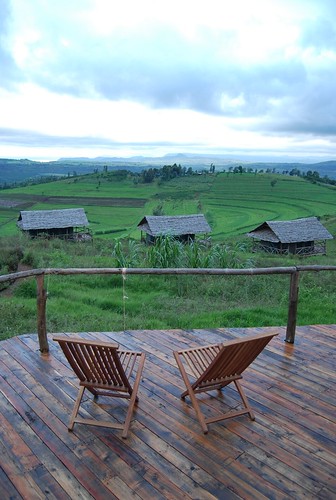 But when you finally check out of the Rhotia Valley Tented Lodge and Children’s Home, and trust me you will do so reluctantly, you’ll feel better about yourself because you’ve supported a great cause. You see all the profits from your nirvanic experience will fund a children’s home built nearby to educate and provide for the needs of Rhotia Valley’s less fortunate kids. So you don’t drive away feeling sinful for tasting the divine in the land of need. In fact the only guilt you’ll experience is from not paying more than you did. It’s beautiful! Like losing weight after spending the day in an all-you-can-eat hot fudge brownie bar.
But when you finally check out of the Rhotia Valley Tented Lodge and Children’s Home, and trust me you will do so reluctantly, you’ll feel better about yourself because you’ve supported a great cause. You see all the profits from your nirvanic experience will fund a children’s home built nearby to educate and provide for the needs of Rhotia Valley’s less fortunate kids. So you don’t drive away feeling sinful for tasting the divine in the land of need. In fact the only guilt you’ll experience is from not paying more than you did. It’s beautiful! Like losing weight after spending the day in an all-you-can-eat hot fudge brownie bar.
When I first heard of Rhotia Valley Tented Lodge and Children’s Home I was in Zanzibar, and was reluctant. Our Dutch friends, who recommended our safari itinerary and Jackson for a driver, also raved about this magical “tented lodge” that we just HAD to do. So before I left Zanzibar, I called Marise Koch to reserve our spot.
Marise is the brains and heart behind this operation. She and her husband are also Dutch but are not strangers to the area. They’ve been serving Rhotia Valley as doctors for years, developing a bigger vision. I tried to negotiate the already low prices over the phone, something I had trained myself to do, but still feel guilty about. I agreed to the price and planned to meet when we arrived.
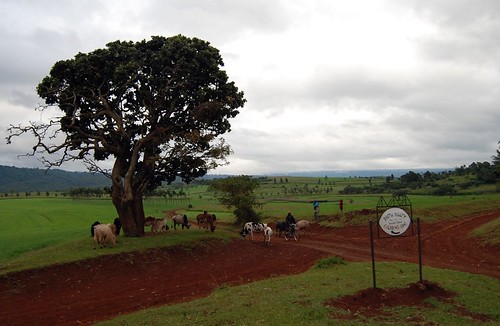 It had been a long day, filled with close encounters of the African kind. The air was crisp, cool and damp as we approached the property. Sun falling, the rich colors of red earth beneath a lush green spotted with colors from flowers both wild and cultivated. It was landscape neither painter nor picture could ever recapture. I soaked it in as I stood through the sunroof trying to get as close as possible to the source of serenity that swelled in my soul.
It had been a long day, filled with close encounters of the African kind. The air was crisp, cool and damp as we approached the property. Sun falling, the rich colors of red earth beneath a lush green spotted with colors from flowers both wild and cultivated. It was landscape neither painter nor picture could ever recapture. I soaked it in as I stood through the sunroof trying to get as close as possible to the source of serenity that swelled in my soul.
Everything exceeded expectation. The landscape. The “tents”, which were nicer than most hotels I’ve stayed in (and I’ve stayed in a LOT). The food. The service. The décor, which I later learned was entirely provided by local skill. Even Mrs. Koch, who joined us later in the evening after having hiked something like 10 miles from Ngorongoro Crater with 10-12 men helping her hack the way. She joined us but just for a moment. She was warm, beautiful, full of life, and after saying hello she returned to the African men who sat visibly exhausted but happy, laughing I presume over the days events.
 It’s easy to forget everything, like some type of ancient meditation while sitting on a large deck with a light drink, or smoking a gentle pipe. But when you finally come back down from that cloud which seemed so far from reality, you remember something- the children. The same children who greeted you with glowing smiles and waving hands as you rode by. And you can’t help but smile to yourself at the wonderful work that one special couple has begun so that one special community will never be forgotten.
It’s easy to forget everything, like some type of ancient meditation while sitting on a large deck with a light drink, or smoking a gentle pipe. But when you finally come back down from that cloud which seemed so far from reality, you remember something- the children. The same children who greeted you with glowing smiles and waving hands as you rode by. And you can’t help but smile to yourself at the wonderful work that one special couple has begun so that one special community will never be forgotten.
Do yourself a favor. If you ever plan on visiting Africa and doing a safari-which is one of the coolest things you will ever do-stay at the Rhotia Valley Tented Lodge and Children’s Home. This is one thing you should do for yourself, and by doing so you’ll be doing it for the children as well. Self and service have never worked so well together.
August 8, 2008 5 Comments
The King of the Jungle
 When choosing a safari, you have options: Tanzania, Kenya, Maasai Mara, Serengeti. But there is one place that stands out. The gathering place. A crater created to gather life. With a land space of almost 100 square miles, Ngorongoro Crater is massive earthen bowl formed by a collapsed volcano. It is home to approximately 25,000 large animals that include pretty much everything you picture in Africa: elephants, hippopotami, zebra, wildebeests, rhinos, oh yeah and lions!
When choosing a safari, you have options: Tanzania, Kenya, Maasai Mara, Serengeti. But there is one place that stands out. The gathering place. A crater created to gather life. With a land space of almost 100 square miles, Ngorongoro Crater is massive earthen bowl formed by a collapsed volcano. It is home to approximately 25,000 large animals that include pretty much everything you picture in Africa: elephants, hippopotami, zebra, wildebeests, rhinos, oh yeah and lions!
Now, I don’t mean to sound sexist, but when I think of lions I think of the males. Massive maned beasts, crowned with a flowing head of golden intimidation. He is the king, whose voice alone demands undeniable respect, paralyzing its foes before it proceeds to eat their face. It’s true the women do all the work and don’t get the respect, hunting wildebeests and looking after the young whilst the man of the house sleeps something like 20 hours a day. However, when it’s go time and a pack of ruthless hyenas initiate a cowardly but deadly attack, well then there’s no question who you want on your team. After an earth-altering roar, when laughing turns to weeping and trembling hyena scatter like shadows from the sun, that’s when the king claims his crown. That’s what I call a lion, and that’s exactly what I wanted.
 So that’s exactly what I told our safari driver, Jackson, I wanted to see. Well I told him I wanted to see everything but especially lions. Jackson did not disappoint. In two days we had checked off nearly every form of African wildlife desirable. Dancing hippos in muddy pits. Awkward giraffes taking full advantage of their long awkward necks as they inconspicuously peeked around acacias trees. Elephants coating themselves with the dust of the earth as they walked feet from our stilled land cruiser. Antelope. Water buffalo. Zebra. Wildebeests. Then finally… the lions.
So that’s exactly what I told our safari driver, Jackson, I wanted to see. Well I told him I wanted to see everything but especially lions. Jackson did not disappoint. In two days we had checked off nearly every form of African wildlife desirable. Dancing hippos in muddy pits. Awkward giraffes taking full advantage of their long awkward necks as they inconspicuously peeked around acacias trees. Elephants coating themselves with the dust of the earth as they walked feet from our stilled land cruiser. Antelope. Water buffalo. Zebra. Wildebeests. Then finally… the lions.
We had crossed path with another driver, who in native tongue told Jackson there had been lion spottings in a specific area of the crater. We started the car and moved across the floor of the massive crater like a comet tailed by a cloud of African dust. “Elephants…” Someone noticed and pointed out. Impressive, but not worthy of detour, for we were in hunt for something much more grand. We approached the promising area. I stood on the arms of the seat below, head through roof panning the plains for any variance in coloring.
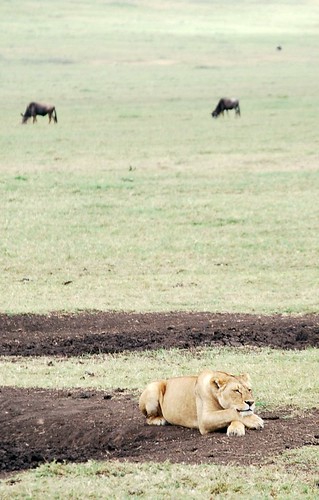 A khaki lump was spotted in the like-colored grass. Lions. Well sort of… it was girl lions. I’d like to tell you a story about how incredible it was. About the herd of buffalos who approached and were attacked and the alligators who fought for rights. But nothing of the sort happened. One stood, crouched promisingly, and after the alert beests moved back, it laid right back down. I’m sure there’s something sinful about being disappointed at a lion spotting, but I was. Fortunately, the story doesn’t end there.
A khaki lump was spotted in the like-colored grass. Lions. Well sort of… it was girl lions. I’d like to tell you a story about how incredible it was. About the herd of buffalos who approached and were attacked and the alligators who fought for rights. But nothing of the sort happened. One stood, crouched promisingly, and after the alert beests moved back, it laid right back down. I’m sure there’s something sinful about being disappointed at a lion spotting, but I was. Fortunately, the story doesn’t end there.
We had checked nearly every animal off the list, even the lion (woopadee doo!), but there was one we had yet to spot. The rhinoceros . Pronounced rhino-SAURUS because it’s pretty much the only “bad-ace mutha” of a species who somehow made it through the prehistoric holocaust that claimed his dinosaur brethren. The day was coming to a close, we would have to leave soon. Then alas! We spotted and with the help of a zoom lens confirmed a rhino. It was far off, but headed our direction. It was big. It was intimidating. It was with child. We stopped the car.
Slowly but surely, the prehistoric beast approached. Closer, and closer. Mother and child-grazing as they moved. The magnificent mammal crossed 50 feet in front of our vehicle. “Jackson…” I whispered. “ Let’s drive closer…” 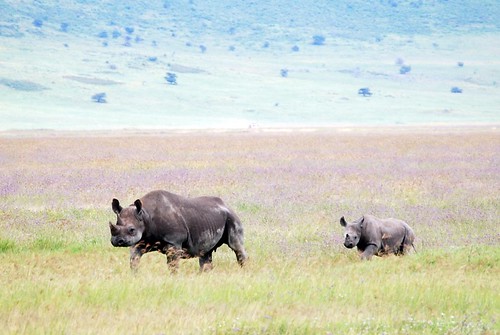 Faithful to his paying friends, Jackson started the car, cautiously creeping closer. We weren’t far off anyway but with in seconds we were uncomfortably close. The startled mother turned instantly. “Pffshhh! Pffshhh!” I watched as the angry air fired through its fuming, flexing nostrils.
Faithful to his paying friends, Jackson started the car, cautiously creeping closer. We weren’t far off anyway but with in seconds we were uncomfortably close. The startled mother turned instantly. “Pffshhh! Pffshhh!” I watched as the angry air fired through its fuming, flexing nostrils.
Without a second lost, the rhino was moving full speed like a tank through the grass. We had waged war, but it had the stronger army. We were confident too. Jackson pinned the pedal to the floor, and explosion of dust rolled through the sky, wheels spinning, spitting as the infuriated rhino approached. Finally the wheels caught, pinballing us around the sunroof. We got away and after a few intense seconds the air was a still as before. The rhino returned to its alerted child who returned to grazing unaffected. We stopped, breathed, and watched.
Sun setting, sky red, we climbed the walls of this natural wonder. The ride was quiet. A new peace settled our souls as we looked back at this comely, yet savage kingdom. I left satisfied save one question… where the heck was the rhino when the “king” was chosen?
August 5, 2008 No Comments
Buggin’ Out
Hitchcock would have been tickled with inspiration. Remember in the Good Book when Moses is in Egypt and he’s all: “Let my people go!” and then Pharoh’s like: “ Uhm… no” (paraphrased)? The next thing you know there are bugs everywhere. In their soup, in their water, in their hair…everywhere! Well, I have no way to prove this but I think I know where they came from: Arusha, Africa.
The day was damp. The sun had yet to be seen but you could tell by the lessoning light it had retired for the evening. Already our day had its fill of unnecessary adventure, when our plane landed at a different airport than it was scheduled to. Fortunately things were calming down. The guesthouse we checked into was run by the Catholic Church and was everything you would hope: simple and clean. The workers didn’t speak much English but enough to point the right direction for dinner.
Before I continue, you should know a couple things about Africa. First, tourists are advised never to walk around at night. Even most locals avoid it for safekeeping. Second, the power can go out at anytime. The suggested restaurant was down the street but at least had streetlights to chase the shadows, so with natural light fading we decided it was our best option.
The restaurant was nice: outside, covered, with a fine assortment of Italian and Indian food to choose from. We sat. We ordered. We waited and relaxed in the cool, humid evening air. Then the atmosphere started to change. It began with the purr of a generator, compensating for power that had apparently gone out. Then I notice a slight movement out of the corner of my eye. Bugs, and not just a few. I’m not talking about cute little moths with curly tongues and adorable antennas. No these were long flying worms.
Swarm by swarm they moved through the restaurant. It became clear these soulless larvae had been sent by devil himself the way they flew aimlessly about, repetitively trying to end their tormented lives by pounding into the light. They had wings like dragonflies, but the bodies like grubs. Oh yes, and I forgot to mention something: Mandi, the friend I was traveling with- she has bugaphobia. Not like “oh-that-beetle-is-gross” phobia. More like “that-bug-brushed-my-hand-so-I’m-gonna-pass-out-and-die” phobia. I knew we were in trouble.
I played it cool, pretending I didn’t notice there were flying worms grazing my head, probably in search of some cool cavity to raise a family in. And judging by my friend’s frozen stair and shortness of breath, any attempt at light conversation was going nowhere. So like Moses in Egypt, I knew it was time to leave. I handed Mandi my hooded jacket. “Put this on. Follow right behind me and just look down at my feet.” I said as looked across the room as the ceiling darkened and morphed like a cloud of disgustingness.
I thought if we could just get through the restaurant it would get better. We briskly moved to the sounds wings wizzing past our ears. We made across then passed by the illuminated sign where worms began to pile up like leaves under an autumn tree, squirming and stunned from flying full force into the hard sign. Fortunately, the further we got from the generated-lights of the restaurant, the fewer the bugs. Unfortunately, there was also less light.
I stood and stared into the dark desert across which rested the promise land of a clean room and bug nets. Meanwhile, my thoughts ran with the warnings of the night. Mandi behind, darkness in front, we started down the road. My pace was quick, my words few. An occasional squeal and dry heave assured me my friend was right behind. Then into the darkness my name was all but yelled. I looked back. “Derek… Derek, there’s one on you!! There’s one on your shoulder!!” “Mandi…” I said. “I’ll be ok with the bugs, I just don’t want to get jumped…” I shook my jacket, quivered my spine and continued.
We passed a couple shadowy figures until eventually we saw a light. A man sat, darkly at the entrance of our guesthouse with a lantern lit. The most beautiful sight you ever saw, especially if you were Mandi. We closed the windows, lit a lantern and once our appetites returned, finished the pizza we ordered hours before.
Everything happens for a reason right? Maybe this was to remind me to be thankful. Thankful for lighted streets. Maybe for indoor restaurants. Or maybe it was just to make me stronger. Stronger so I would be ready for something like… say getting charged by a rhino. But that’s another story…
July 22, 2008 No Comments
Make Friends
I’ll be honest, I was a little anxious when I climbed into the Zanzibar cab. First of all, the guy who offered me the ride the night before was not the guy now driving the cab. Secondly, I was told there would be a group, turns out it was just Mandi and I. Finally, a few days prior I learned of a group of masked men hijacking a restaurant in the area by gunpoint. However, we had a flight to catch and were already cutting it close.
So I did what every savvy traveler would do. I got in. But to make sure it was legit I did the “ask for a receipt” trick. “Receipt?” asked the driver and supported it with an are-you-kidding look. “Ah, never mind,” I replied. “I’ll be alright.” I moved on to my next strategy. Make friends.
One of the first things we learn in life is mankind’s favoritism. The coach who starts his son, the Class President elected by her cute smile, the prom-king synonymous with “starting quarterback”. The examples are endless. So I learned at an early age that befriending unpopular professors can afford you extra time on important papers. Or that a charity laugh will get you a long way in life (though you do increase risk of being tagged “brown noser”).
Now having grown into a strapping young man, I find it just as useful traveling. Everyone wants a friend, and you are less likely to rob or take advantage of your friends… that’s the theory anyway. So sitting in the back of a cab, with a visibly disgruntled driver leading us through dirt roads, I start in. “Are you from here? Did you like growing up here? Is your family here?” Etc., etc.
Within minutes we were talking about the good ol’ days, life on the island, changes over the years. Then the car slowed. It came to a stop in the middle of the road. Police approached the window. I watched as the driver’s demeanor changed. Driver offered a shallow greeting. Policeman returned and looked with casual suspicion to the back seat. A quick exchange was made in Swahili and the driver waved on. With irritated eyes, the he gave more attention to his rearview than the road before, mumbling curse words. “Do you think the government is corrupt here?” I asked.
With that he explained the people’s contempt. “Look around,” he said. I did. The landscape was rich, the people poor. He spoke of the rich soil, the spices that were sold all over the world, and the people whose state was worsening. The people were tired. “Is there no one making a stand?” I asked. There were some but not many. “You need to start a revolution,” I told the man. There was hope in his eyes.
In all of my travels, I have yet to see a place so ripe for revolution. The people are unsettled, but aware. More than once I noticed people roll their eyes at the mention of government. Though living in paradise, they were not happy.
He gave us a tour through the famous Stone Town, pointing out architecture and buildings from different political eras. We reached the airport with time to spare. “I will watch for your name…” I told the man who smiled and handed me his card in return. I shook his hand. We were friends.
July 9, 2008 No Comments
Zanzibar-Touched by Tourism
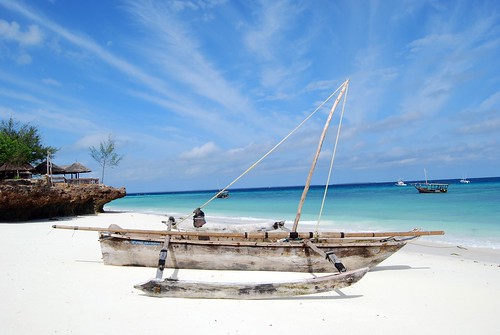 It’s considered by many to be the number one beach location in East Africa, but we had no idea what we were doing. Sitting in the terminal waiting for my final 30-minute flight to Zanzibar, I thought I would ask someone who might. I targeted two fellow travelers sitting across the room with backpacks at their feet. I took the “maybe we can split a cab” approach, which worked like a charm.
It’s considered by many to be the number one beach location in East Africa, but we had no idea what we were doing. Sitting in the terminal waiting for my final 30-minute flight to Zanzibar, I thought I would ask someone who might. I targeted two fellow travelers sitting across the room with backpacks at their feet. I took the “maybe we can split a cab” approach, which worked like a charm.
The two Amsterdamians had spent the last several months in Africa working at a hospital where they studied medicine as part of their schooling back in home. Not only were they terrifically friendly, they had their stuff together. Dutch friends, Mandi and I split a cab to the Northern part of the island, where we were greeted my another Dutchman who had everything sorted out. We checked in, then over a Tanzanian beer, and under a faded African sky we swapped stories in the cool salty air.
Zanzibar is an island in which the history is as rich as the white sand beaches that separate the turquoise sea from some of the world’s finest spices. Scuba diving, snorkeling, sailing on traditional dhow ships, sampling the spices peppered throughout the island: there are plenty of activities. Or you can simply explore underprivileged alleys, sit with locals over a plate of rice, beans and fish head, and relax on a stunning spread of seaside sand.
 It is an intriguing place, this Zanzibar. Women covered by dark veils expose only their focused eyes and a small section of surrounding skin. Men mend the nets that catch their livelihood. Children play football or practice moves in the sand. The beaches are beautiful. The water clean, clear, and home to small simple sailboats of Arabic decent.
It is an intriguing place, this Zanzibar. Women covered by dark veils expose only their focused eyes and a small section of surrounding skin. Men mend the nets that catch their livelihood. Children play football or practice moves in the sand. The beaches are beautiful. The water clean, clear, and home to small simple sailboats of Arabic decent.
As you sit studying the sails wandering across the water, men young and old pose friendship as they practiced their own form of sales. Trinkets, beads, henna, massage, the offers are endless. We were there in the calm before the storm of tourist season. And as I sat in the sand, a people’s reality became more real.
The seas were soothing, but the air tumultuous. I’ll admit I was slightly spoiled from a Malawian people who earned the title: “friendliest people on earth” ; however, the change here was significant. Anxious to interact, I would offer a Swahili “Jambo” to every passerby, and unless there was something to sell, the few who felt obliged to respond, generally did so unenthusiastically and without eye contact. Whereas, in Malawi I felt welcome even given unearned respect for simple hue of my skin, in Zanzinbar it was quite the opposite. Suddenly white did not mean welcome.
Tourism drives this island. In a land over populated with poverty, a tense dichotomy is born. The people are forced to fight for tourist attention just to feed their families.  Tourists are annoyed by bombardment. Locals irritated, watch at an untouchable distance the frivolity of funds flowing freely from foreigners on the soil of their own paradise.
Tourists are annoyed by bombardment. Locals irritated, watch at an untouchable distance the frivolity of funds flowing freely from foreigners on the soil of their own paradise.
I sat on the other side, hoping reach across the divide. To connect on a level less monetarily based. To connect. To converse. It happened a couple times, but it wasn’t easy. I’m sure it meant more to me then them. I was eager, but I suppose I can understand their excitement to make friends was not so enthusiastic as mine.
July 1, 2008 2 Comments
Good or Evil?
“Do you think mankind is basically good or evil?” I asked the man sitting next to me. He paused to think…his answer surprised me. It was a topic discussed amongst friends months earlier; the conversation was of the broader idealism vs. “reality”. The man sitting next to me worked for the United Nations High Commissioner for Refugees. He was a Senior Officer with plans of retiring soon and was returning to a Sudanese refugee camp.
After an inspiring time in Malawi, I was headed to Dar Es Salam, Tanzania, which, if direct, should be just over an hour flight. However, things work a little differently in Africa, so rather than flying direct, as my ticket indicated, I would fly to North Malawi, then Kenya, then finally to Dar Es Salam. Needless to say, I had a little time on my hands, and when I learned my neighbor worked for the UN Refugee department, I figured I’d jump right in.
He paused when I asked. Then to lessen the pregnancy, I joked, “Maybe more of a philosophical question…” He smiled and returned to reflection. This is a man who sees mankind at its lowest; when their country and people have turned on them; when disaster, natural or mankind, has stripped of them of every comfort they have ever known, and in the final hope of survival, they are forced to leave the only thing they do know-home.
‘Tis better to give than to receive. Yet when it comes to giving your family a meal to survive, the temptation to take what you have not received becomes awfully real. When people are in desperate situations, they become aggressive…” he replied. He began to speak about the tendencies of mankind when pushed to their limits. We talked about the effects that has on neighboring country(ies). The strain-economically, and socially. Desperate times bring out desperate reactions.
I believe in life, nearly everything is self- perpetuating. When you do an act of good, especially underserved, it stirs something in the receiving party who then wants to do something good to someone else. Likewise, if you over react in anger or frustration, the receiving party is stirred by injustice and reacts in kind. Therefore, it’s better to do good. Yet in the drive of self-preservation, these golden ideals break down. If my daughter is starving to death and my neighbor has two days worth of food, I would be terribly tempted to take, which in turn places my neighbor in the same position the next day, forcing him to take what is not his, to preserve what is. And so the cycle of aggression begins. It’s hard to think of tomorrow, when you’re not sure you’ll make it through today.
I’m not sure Mr. Miselini ever answered my question before he left half-way through my trip, although with an empty seat, he did leave my head full of thoughts. I arrived Zanzibar with more questions and less answers.
On the turquoise shores of a small beautiful island, I met another random person. However, this conversation was not quite as stirring as the rasta and I talked about how great Italians are, while he smoked a joint and tried to sell me on a 1/2 day snorkeling trip. No, can’t say that for sure… I wasn’t as stirred, but my rasta friend sure seemed inspired.
June 23, 2008 No Comments


